37th G8 summit
| 37th G8 summit | |
|---|---|
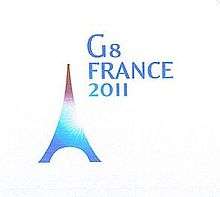 37th G8 summit official logo | |
| Host country | France |
| Dates | May 26–27, 2011 |
| Follows | 36th G8 summit |
| Precedes | 38th G8 summit |
The 37th G8 summit was held on May 26–27, 2011, in Deauville, France.[1]
Previous G8 summits have been hosted by France in locations which include Rambouillet (1975); Versailles (1982); Grande Arche, Paris (1989); Lyon (1996); and Évian-les-Bains (2003).[2]
Overview
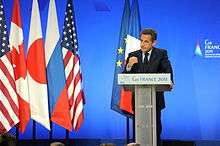
The Group of Six (G6) was an unofficial forum which brought together the heads of the richest industrialized countries: France, Germany, Italy, Japan, the United Kingdom and the United States starting in 1976. The G7, meeting for the first time in 1979, was formed with the addition of Canada. Hence, The G8, meeting for the first time in 1997, was formed with the addition of Russia.[3] In addition, the President of the European Commission has been formally included in summits since 1981.[4] The summits were not meant to be linked formally with wider international institutions; and in fact, a mild rebellion against the stiff formality of other international meetings was a part of the genesis of cooperation between France's President Giscard d'Estaing and West Germany's Chancellor Helmut Schmidt as they conceived the initial summit of the Group of Six (G6) in 1975.[5]
The G8 summits have inspired widespread debates, protests and demonstrations; and the two- or three-day event becomes more than the sum of its parts, elevating the participants, the issues and the venue as focal points for activist pressure.[6]
The form and functions of the G8 were reevaluated as the G-20 summits evolved into the premier forum for discussing, planning and monitoring international economic cooperation.[7] The "new G8" is refocusing on the subjects of common interest to the G8 countries, including geopolitical and security issues.[2]
The forum continues to be in a process of transformation.[8]
Leaders at the summit
The G8 is an unofficial annual forum for the leaders of Canada, the European Commission, France, Germany, Italy, Japan, Russia, the United Kingdom and the United States.[4]
The 37th G8 summit was the last summit for French President Nicolas Sarkozy, Italian Prime Minister Silvio Berlusconi, Japanese Prime Minister Naoto Kan and Dmitry Medvedev as President of Russia (Medvedev would return to the 38th G8 summit the following year as Prime Minister of Russia, leading Russian delegates in place for the newly elected President Vladimir Putin).
Core G8 participants
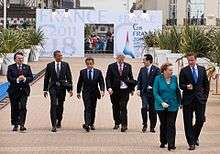
These summit participants represent the current core members of the international forum:[9]
| Core G8 members Host nation and leader are indicated in bold text. | |||
| Member | Represented by | Title | |
|---|---|---|---|
| |
Canada | Stephen Harper[10] | Prime Minister |
| |
France | Nicolas Sarkozy[11] | President |
| |
Germany | Angela Merkel[12] | Chancellor |
| |
Italy | Silvio Berlusconi[13] | Prime Minister |
| |
Japan | Naoto Kan[10] | Prime Minister |
| |
Russia | Dmitry Medvedev[11] | President |
| |
United Kingdom | David Cameron[11] | Prime Minister |
| |
United States | Barack Obama[11] | President |
| |
European Commission | Jose Manuel Barroso[11] | President |
| European Council | Herman Van Rompuy[14] | President | |
Invited leaders
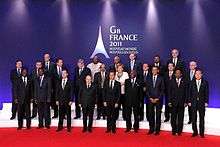
A number of national leaders are traditionally invited to attend the summit.[2] These invitees participate in some, but not all, G8 summit activities. This year, African leaders at the G8 included:
-
 Algeria Abdelaziz Bouteflika, President[15]
Algeria Abdelaziz Bouteflika, President[15] -
 Egypt Essam Sharaf, Prime Minister[11]
Egypt Essam Sharaf, Prime Minister[11] -
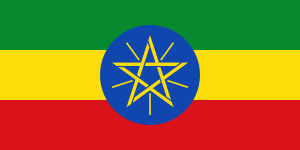 Ethiopia Meles Zenawi, Prime Minister
Ethiopia Meles Zenawi, Prime Minister -
 Equatorial Guinea Teodoro Obiang Nguema Mbasogo, President[16]
Equatorial Guinea Teodoro Obiang Nguema Mbasogo, President[16] -
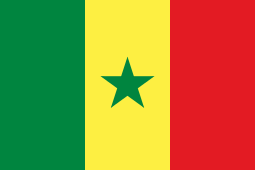 Senegal Abdoulaye Wade, President[15]
Senegal Abdoulaye Wade, President[15] -
 South Africa Jacob Zuma, President[15]
South Africa Jacob Zuma, President[15] -
 Tunisia Béji Caïd Essebsi, Prime Minister[11]
Tunisia Béji Caïd Essebsi, Prime Minister[11]
The President of Nigeria was invited, but Goodluck Jonathan decided not to attend at the last minute. He worried that volcanic ash from an eruption in Iceland might delay his return flight to Nigeria; and this could disrupt his planned inauguration ceremonies on May 29.[17]
Heads of international organisations and institutions
Leaders of the major international organisations have also been invited to attend previous summit meetings.[2] Among this year's summit participants were:
- Arab League Amr Moussa, Chairman[18]
- African Union (AU) Jean Ping, Chairman[15]
- New Partnership for Africa's Development (NEPAD)[2]
- United Nations Ban Ki-moon, Secretary-General[19]
Priorities
Traditionally, the host country of the G8 summit sets the agenda for negotiations, but world events caused the list of topics to expand, including such issues such as the Fukushima nuclear accident[20] the European sovereign debt crisis,[21] the conflict in Libya, Iran’s nuclear programme, Syria’s crackdown on pro-democracy protests, and the selection of a new managing director for the International Monetary Fund.[22]
Issues
The summit is a venue for resolving differences among its members. As a practical matter, the summit was also conceived as an opportunity for its members to give each other mutual encouragement in the face of difficult economic decisions.[5] The G-8 has become a forum for political and strategic discussions, and as a caucus within the G-20.[23]
Schedule and Agenda
The agenda for the summit included some issues which remained unresolved from previous summits.[24] French general priorities included:
- New common challenges: the Internet, innovation, green growth and a sustainable economy, and nuclear safety[25]
- The 'Arab Springs': a partnership for democracy[25]
- Strengthening the partnership with Africa: a long-term vision[25]
- Peace and security: traditional themes of the G8[25]
Some of the specific topics on the agenda were:
- Afghanistan;[26]
- G8 + Broader Middle East and North Africa (BMENA);[27]
- The Internet: new challenges[28]
- Non-proliferation of Weapons of Mass Destruction[29]
- The G8's Partnership with Africa[30]
- Transatlantic Cocaine Trafficking[31]
- Counter-terrorism[32]
- G8 political and security issues[33]
Citizens' responses and authorities' counter-responses
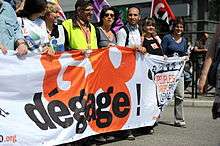
Protest groups and other activists were expected to make a showing at the summit.[34] The slogan G8 dégage ("G8 Go Away") was a recurring element of the demonstrations.[35]
Protesters expressed their concerns about capitalism and what they perceive as the imperialism of western liberal democracies. The demonstrators are widely understood to be against globalisation.[35]
Accomplishments
This annual gathering of international leaders is an international event which is observed and reported by news media; and the G8's relevance and accomplishments are continuing topics of discussion.[36] The event brings leaders together not so they can dream up quick fixes, but to talk and think about them together.[37]
The 2011 summit meeting was marked by what the G8 called the "Deauville Partnership" with the people of North Africa.[38] As a start, $20 billion were pledged in support for Tunisian and Egyptian reforms due to the Arab Spring.[39]
Security

Security planning was designed to ensure that the summit's formal agenda can remain the primary focus of the attendees' discussions;[40] but effectively this meant converting the seaside resort into a fortress for the G8.[41]
Budget
In 2010, President Sarkozy projected that the summits in Deauville and Cannes would cost "ten times less" than the preceding Canadian summits.[42]
Business opportunity
For some, the G8 summit became a profit-generating event. For example, the G8 Summit magazines have been published under the auspices of the host nations for distribution to all attendees since 1998.[43]
According to the Mayor of Deauville, "Our main interest is the economic implications."[44]
Gallery
Core G8 participants
See also
- E-G8 Forum
- 2011 G-20 Cannes summit
- G6
- G7
- International Panel on Climate Change
- United Nations Framework Convention on Climate Change
Notes
- ↑ Présidence française du G20 et du G8, Dossier de presse,p. 27; excerpt, Le sommet du G8 aura lieu les 26 et 27 mai à Deauville (The G8 summit will take place on May, 26th and 27th in Deauville); "Le prochain G20 aura lieu à Cannes," Le point (France). 12 November 2010; retrieved 13 February 2011
- 1 2 3 4 5 G20/G8 France 2011 official site, What is G8?; retrieved 13 February 2011
- ↑ Parliament (UK), "G20 rises, G7 & G8 fall?"; see G8 + G20 + BRICs represented in relational graphic at bottom of page; retrieved 13 February 2011
- 1 2 "Factbox: The Group of Eight: what is it?" Reuters (UK), 3 July 2008; retrieved 13 February 2011
- 1 2 Reinalda, Bob and Bertjan Verbeek. (1998). Autonomous Policy Making by International Organizations, p. 205.
- ↑ "Influencing Policy on International Development: G8," BOND (British Overseas NGOs for Development). 2008; retrieved 13 February 2011
- ↑ Parliament (UK): Townsend, Ian. "G20 & the November 2010 Seoul summit" (SN/EP/5028) Archived November 7, 2010, at the Wayback Machine., 19 October 2010; excerpt, "Today, we designated the G-20 as the premier forum for our international economic cooperation" citing "Pittsburgh G20 Leaders’ summit communiqué," 25 September 2009, paragraph 50.
- ↑ Congressional Record Service, R40977: Nelson, Rebecca M. "Implications of the transition from G-7 to G20," pp. 22-26. The G-20 and International Economic Cooperation: Background and Implications for Congress, 9 December 2009; retrieved 13 February 2011
- ↑ Rieffel, Lex. "Regional Voices in Global Governance: Looking to 2010 (Part IV)," Archived June 3, 2010, at the Wayback Machine. Brookings (US). 27 March 2009; retrieved 13 February 2011
- 1 2 "G8 highlights euro debt risk to world economy," Independent (UK). May 26, 2011; retrieved 2011-05-26.
- 1 2 3 4 5 6 7 Wintour, Patrick. "G8 summit: UK offers Egypt and Tunisia £110m to Boost Democracy,: Guardian (UK). 26 May 2011; retrieved 2011-05-26.
- ↑ Brost, Marc and Jörg Lau. "Ab in die Ecke," Die Zeit (Germany). 26 Mai 2011; retrieved 2011-05-26
- ↑ "Deauville, Berlusconi a Obama: da noi dittatura dei giudici di sinistra," Corriere della Sera (Italy). 27 May 2011; retrieved 2011-05-27
- ↑ Tang Danlu. "EU leaders meet press before G8 summit," Xinhua (PRC). 27 May 2011; retrieved 2011-05-27
- 1 2 3 4 "AU demands end to NATO Libya strikes," Agence France Presse (AFP), 26 May 2011; retrieved 2011-05-26
- ↑ Bejot, Jean-Pierre. "Les bons élèves de la « démocratie » africaine invités au bord de la mer par Nicolas Sarkozy," La Dépêche Diplomatique Afrique (Senegal). 25 May 2011; retrieved 2011-05-27
- ↑ Shehu, Mohammed. "Ash Cloud Stops Jonathan's Trip to France," Daily Trust (Nigeria). 27 May 2011; retrieved 2011-05-27
- ↑ MacCormaic, Ruadhán. "G8 summit set to approve aid package for Tunisia and Egypt," Irish Times (Eire). 26 May 2011; retrieved 2011-05-27
- ↑ Babalola, Jide. "Ki-Moon in Nigeria to push health campaign," The Nation (Nigeria). 23 May 2011; 2011-05-27
- ↑ Jessop-Kolesnikov, Sonia. "As G-8 Meets, Asian Leaders Seek a Bigger Role," New York Times (US). May 25, 2011; retrieved 2011-05-26.
- ↑ Erlanger, Steven and Liz Alderman. "Euro Crisis Looms for Group of 8," New York Times (US). May 25, 2011; retrieved 2011-05-26.
- ↑ MacCormaic, Ruadhán. "G8 summit set to approve aid package for Tunisia and Egypt," Irish Times
- ↑ Jessop-Kolesnikov, "As G-8 Meets"; excerpt, According to Tommy Koh of Singapore, "the 2008 global financial crisis showed that a body that more accurately reflected the weight of emerging economies was needed to help steer the world out of that crisis .... G-20 has thus supplanted the G-8 as the main body for global financial and economic cooperation [and] the G-8 still remains as a forum for political and strategic discussions, and as a caucus within the G-20"; retrieved 2011-05-26
- ↑ Kaur, Hardev. "G20 leaders must deliver on their promises," The New Straits Times (Malaysia). 20 February 2009.
- 1 2 3 4 G20/G8 France 2011, "The priorities of the French Presidency"
- ↑ G20/G8 France 2011, Afghanistan; retrieved 13 February 2011
- ↑ Karabell, Zachary. "On the Heels of Revolution, Economic Realities Arrive," New York Times (US). May 25, 2011; G20/G8 France 2011, "G8 + BMENA"; retrieved 13 February 2011
- ↑ G20/G8 France 2011, Internet challenges; retrieved 13 February 2011
- ↑ G20/G8 France 2011,Non-proliferation/WMDs; retrieved 13 February 2011
- ↑ G20/G8 France 2011, G8 + Partnership with Africa; retrieved 13 February 2011
- ↑ G20/G8 France 2011, Cocaine trafficking; retrieved 13 February 2011
- ↑ G20/G8 France 2011, Counter-terrorism; retrieved 13 February 2011
- ↑ G20/G8 France 2011,Political and security issues; retrieved 13 February 2011
- ↑ Crispian Balmer and Kevin Liffey. "Q+A: Election defeat poses problems for Sarkozy," Reuters (UK). 21 March 2010; retrieved 13 February 2011
- 1 2 Haddadi, Anissa. "Obama in Deauville tomorrow: Farewell to the UK and Hello anti G8 Protesters," International Business Times (UK). 25 May 2011; retrieved 2011-05-27
- ↑ MacCormaic, "G8 summit set to approve aid package," Irish Times; Lee, Don. "On eve of summit, G-8's relevance is unclear," Los Angeles Times (US). 6 July 2008; retrieved 2011-05-27
- ↑ Feldman, Adam. "What's Wrong With The G-8," Forbes (US). 7 July 2008.
- ↑ Zhang Xiang. "G8 leaders wrap up summit, pledge billions of dollars for new partnership with Arab," Xinhua (PRC). 27 May 2011; retrieved 2011-05-27
- ↑ Wintour, Patrick. "G8 summit to pledge £12bn for Arab spring states," Guardian (UK). 27 May, 2011; [http://www.msnbc.msn.com/id/43190972/ns/world_news/ "G-8 leaders back Arab Spring revolts," MSNBC (US). May 27, 2011; retrieved 2011-05-27
- ↑ Schuetze, Christopher A. "A French Town's Bright Shine Belies Its Size," New York Times (US). May 25, 2011; retrieved 2011-05-26.
- ↑ "Deauville transformé en forteresse pour le G8 des 26 et 27 mai,"
- ↑ "Sarkozy says his G8/G20 will cost one-tenth of Canada’s," Globe and Mail (Canada). 27 June 2010; retrieved 13 February 2011
- ↑ Prestige Media: "official" G8 Summit magazine; retrieved 13 February 2011
- ↑ Schuetze, "A French Town"; retrieved 2011-05-26
References
- Reinalda, Bob and Bertjan Verbeek. (1998). Autonomous Policy Making by International Organizations. London: Routledge. ISBN 978-0-415-16486-3; ISBN 978-0-203-45085-7; OCLC 39013643
External links
| Wikimedia Commons has media related to 37th G8 summit. |
- G8 Information Centre
- Graphic: G20 is not simply the 20 largest economies
- Official website. NB: No official website is created for any G7 summit prior to 1995 -- see the 21st G7 summit.

.jpg)
.jpg)






